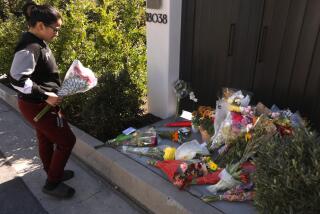John Miner dies at 92; investigator of Marilyn Monroe’s death
- Share via
John W. Miner, a former Los Angeles County deputy district attorney who was an investigator in the 1962 death of Marilyn Monroe and made headlines in recent years when he revealed the contents of private tapes the actress recorded for her psychiatrist shortly before her death, has died. He was 92.
Miner, who believed the tapes helped prove Monroe was not suicidal, died of age-related causes Feb. 25 in a Los Angeles hospital, said Keya Morgan, who interviewed Miner for a pending book and documentary about Monroe’s death.
FOR THE RECORD:
John Miner: In the March 4 LATExtra section, the obituary of former Los Angeles County Deputy Dist. Atty. John W. Miner, an investigator in the 1962 death of Marilyn Monroe, incorrectly reported the date of his death. Miner died Feb. 25, 2010, not Feb. 25 of this year.
“John Miner was an outstanding attorney,” said Dr. Cyril Wecht, a forensic pathologist and attorney, who first met Miner in 1963.
“He had a keen legal mind, he had a sharp intellect, and he had the desire and the willingness to learn as much as he could about various forensic scientific specialties as they applied to individual cases,” Wecht said.
During his years as head of the D.A.’s medical-legal section, Miner was present at the autopsies of Monroe, Sen. Robert F. Kennedy and the victims of the Manson murders, as well as being involved in the trials in the Kennedy and Manson cases.
“He was in charge of making sure the body specimens and artifacts were preserved properly for trial,” said Morgan, who interviewed Miner many times in recent years for his Monroe projects.
It was in the early morning hours of Aug. 5, 1962, when the West Los Angeles police substation received a call that Monroe had died in her Brentwood home.
The autopsy conducted by Dr. Thomas Noguchi, then deputy medical examiner, concluded that Monroe, 36, died of acute barbiturate poisoning, and her death was termed a “probable suicide.”
The autopsy report said that “the stomach is almost completely empty. No residue of the pills is noted.”
“The toxic level was so high she would have had to take 60 to 70 pills,” Morgan said.
“Miner said it was the most bizarre case in American history, where every body specimen disappeared overnight, including the liver, kidney and stomach and its contents, which would have proven definitely she did not kill herself,” Morgan said.
Miner, who believed Monroe was given an enema of the barbiturate Nembutal, never changed his opinion that Monroe did not take her own life; he strongly believed she was murdered.
Contributing to his belief that she was not suicidal were the tapes that Monroe had made for her psychiatrist, Dr. Ralph Greenson.
As reported in a 2005 front-page story in The Times, Greenson played the tapes for Miner during the 1962 investigation only on the condition that he never reveal their contents.
Miner said he took “extensive” and “nearly verbatim” notes of the tapes. The Times reported that he broke his promise many years after the psychiatrist’s death only because some Monroe biographers suggested that Greenson should be considered a suspect in the star’s death.
When that happened, Miner asked Greenson’s widow to be released from his promise.
Among the things Monroe talked about on the tapes, according to Miner’s notes, were her adoration of Clark Gable, a sexual encounter with Joan Crawford, why her marriages to Joe DiMaggio and Arthur Miller failed and her desire to be taken seriously as an actress.
Monroe also praised President John F. Kennedy but did not indicate they had an affair.
Speaking of Robert F. Kennedy, the U.S. attorney general at the time, Monroe said: “As you see, there is no room in my life for him. I guess I don’t have the courage to face up to it and hurt him. I want someone else to tell him it’s over. I tried to get the president to do it, but I couldn’t reach him.”
Miner, The Times reported, maintained that anyone who read the transcript would conclude that “there was no possible way this woman could have killed herself. She had very specific plans for her future.”
Despite those who found Miner credible, Times reporter Robert W. Welkos wrote that “to accept Miner’s story, one must take a leap of faith — he is the only one still alive who claims to have heard the tapes. Greenson died in 1979, and Miner believes he destroyed the tapes.”
A 1982 review of the Monroe case by the district attorney’s office concluded there was “no credible evidence supporting a murder theory.”
Miner was born Dec. 20, 1918, in Cleveland Heights, Ohio. He received both his bachelor’s and law degrees from UCLA and was in private practice before joining the district attorney’s office in 1959. In 1963, he also began teaching at USC’s Institute of Psychiatry, Law and Behavioral Science. He resigned from the D.A.’s office in 1970.
Morgan said Miner is survived by a daughter and a brother.
More to Read
Start your day right
Sign up for Essential California for the L.A. Times biggest news, features and recommendations in your inbox six days a week.
You may occasionally receive promotional content from the Los Angeles Times.







